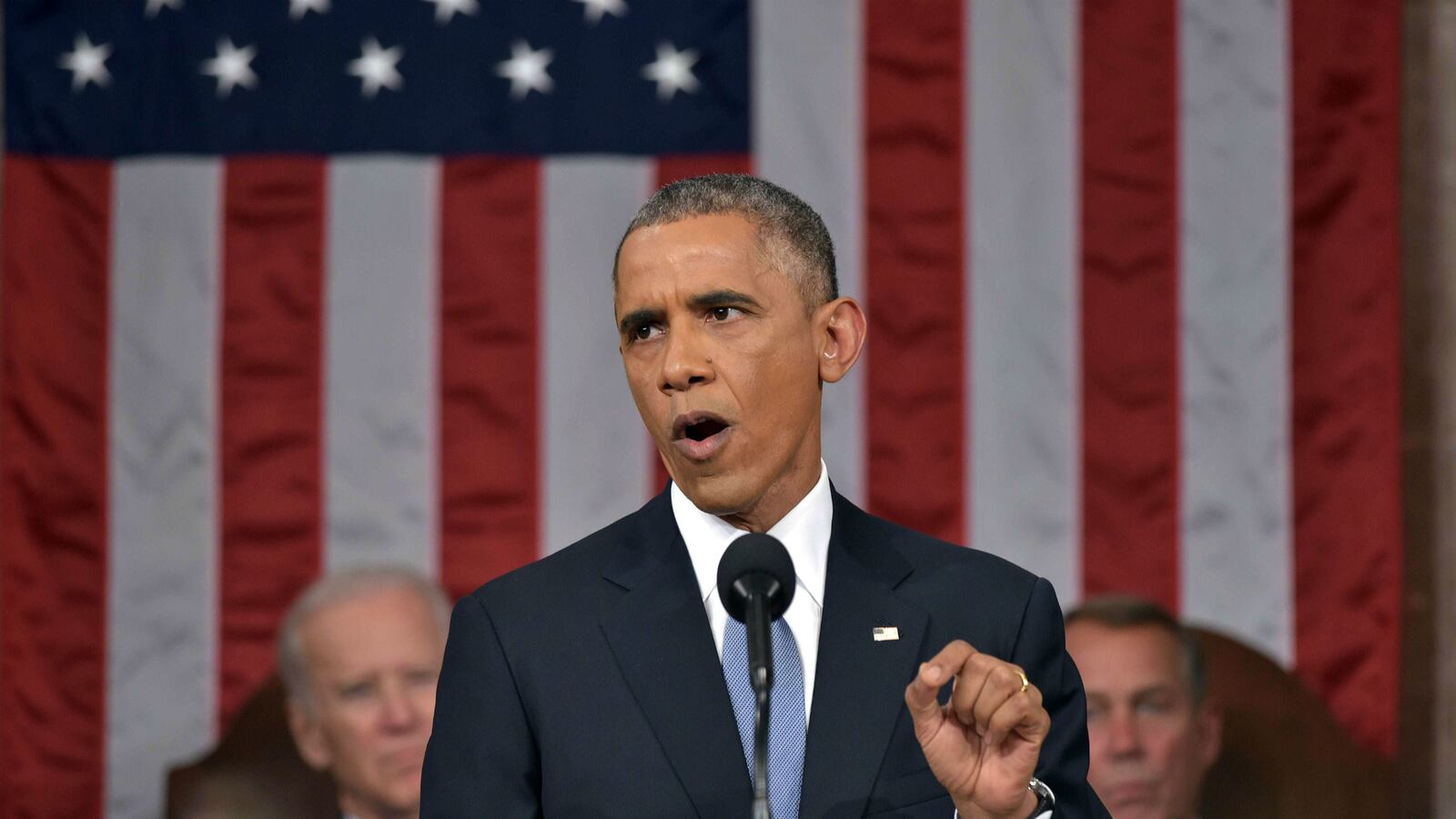Can you remember a time when the political zeitgeist has ping-ponged the way ours has in just two months? The day after last November’s election, Barack Obama was finished. Now, two positive jobs reports and a 60-odd-cent-per-gallon drop in gasoline prices later, he’s the president again. And the Republicans have just taken power and have run Congress for only two weeks, but suddenly they’re kind of on the defensive.
Of course this isn’t to say that Obama is going to get a single plank of the ambitious agenda he laid out in the State of the Union Address through Congress. The Republicans still hold those cards.
But what’s happened in the last couple of months, and what Obama seized effectively with this speech, is this. The mood has changed. The public is open to ideas it wasn’t open to a year ago; even two months ago.
Politics in this country is really about only one thing at a time, and that one thing favors one party or the other. In 1981 and for a few years thereafter, it was about how oppressive the federal government was. Advantage Republicans. For a short time in the late 1980s, it was about how we’d vanquished the Soviet Union (and won a little side war). Advantage Republicans.
For a while in the 1990s, it was about building a future-oriented economy. Advantage Democrats. After 9/11, it was about security. Advantage Republicans. And so on. It’s a little more complicated than this, because thrown into these cycles we have the scandals and the social changes that all have some impact on how people think about things, but basically, this is how American politics rolls: We go through these eras, and the eras make the majority of people decide that one party or the other is better equipped to do something about the challenges.
And now, we seem to be—seem to be—entering an era in which the chief debate is going to be about expanding prosperity downward from the people who’ve enjoyed the lion’s share of the prosperity of the last 30 years. Not positive about that. But that’s the smell. Look at all those minimum-wage initiatives that passed on ballots last November, passed even by a comparatively conservative electorate. Look at Mitt Romney talking empathetically in recent days about the people he didn’t seem to care much about in 2012. Something has turned.
Obama has helped turn it—with a few speeches over the years, and certainly with some of his policies, like health care, which he defended in an impressively in-your-face way in this speech. But even a president can’t turn it himself. He needs luck. And finally he’s had some—the gas prices, the energy explosion, the jobs reports, all of them culminating in a sunnier public mood.
All that adds up to an atmosphere in which a majority of Americans are finally starting to add two and two and get four. The Republicans didn’t give them much. The Great Recession, most notably. Obama, to most of them, still hasn’t given them all that much either, but at least we’re out of that mess and things are finally looking up.
And when things are looking up, people are less anxious, and they can start thinking about things like free community college. In lousy economic times, free community college sounds to your average person like a bunch of airy-fairy liberal nonsense. Like something they’re going to be stuck paying for. In better economic times, it sounds to your average person like a not-half-bad idea, and something they or someone they know might even benefit from.
It’s all public psychology. We liberals have a hard time accepting this. That’s because of Keynes. Keynes, see, has taught us the concept of counter-cyclical investment: that when the economy is in dire straits, that is exactly when the government should be spending a boatload of money. It makes economic sense, to people who read a lot. But to average people, it doesn’t make any common sense. Common sense tells average people that when the economy is in dire straits, you tighten your belt and spend less. This is right for a family, but wrong for a government, which is the opposite of a family, economically speaking. And Lord did it infuriate liberals when Obama himself played into it. He gave these speeches—what, 2010, maybe—when he likened the government to a family sitting around the kitchen table deciding what expenses it needed to cut out.
No! Wrong, wrong, wrong, in economic terms. But in real-life political terms, he was right at least insofar as you can’t get people to think about longer-term economic goals when they’re out of a job, or underemployed. But once that’s turned, you can.
That is what’s turning now—not turned, but turning. And that is what is about to make our political conversation be about this new one thing: sharing the prosperity. The speech was not a great speech, a speech for the ages; but it did understand that, and it did tap into that. People are now willing to start thinking about longer-term economic goals. A quickie CNN poll found that the speech was extremely well-received: 51 percent very positive, 30 percent somewhat positive, only 18 percent negative.
That really should worry Republicans, no matter how many seats they have in Congress. Our politics is becoming about one big thing on which the Republicans have nothing to say. Actually, they do have something to say, and it’s “No!” They looked ridiculous, sitting on their hands, refusing to applaud simple and obvious things that have 60, 65 percent public support. I have a feeling more such moments await them.






